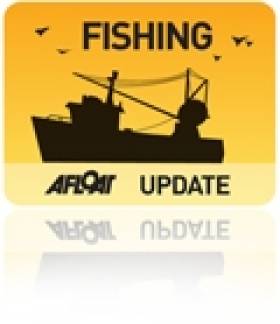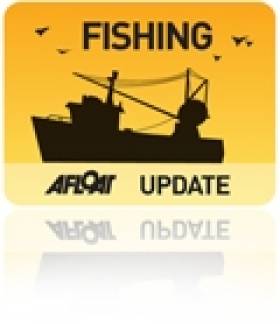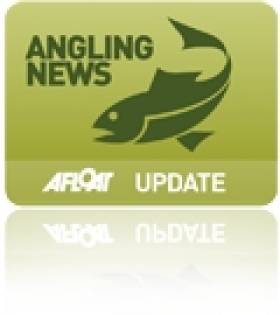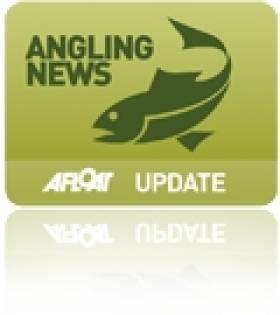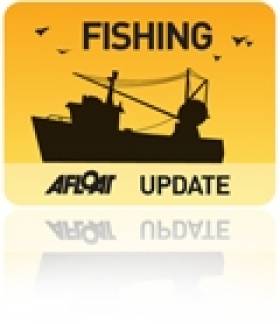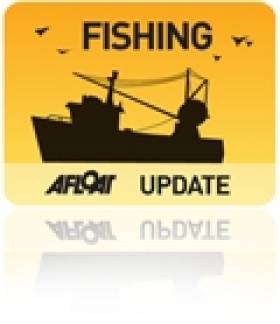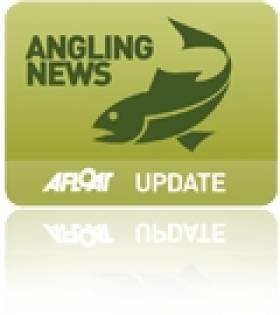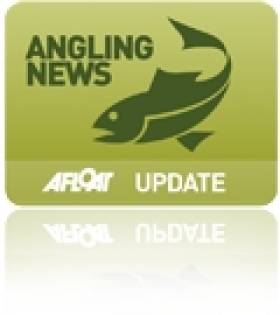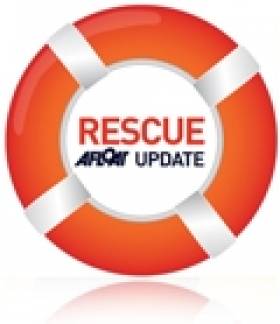Displaying items by tag: Fishing
#TitBonhomme - RTÉ News reports that the families of two Egyptian fishermen who died in the Tit Bonhomme tragedy in West Cork three years ago last week settled their civil actions in the High Court.
Saled Mohamed Ibrahim Aly Eldin and Attia Shabaan were two of four Egyptian fishermen on the Union Hall fishing trawler that sank after running aground in rough seas near Adam's Rock at Glandore Harbour on 15 January 2012.
The incident took the lives of skipper Michael Hayes and fellow crew Kevin Kershaw, whose family settled an action in early 2013, and Wael Mohamed, whose family settled their own High Court action earlier this month.
The latter's brother Abdelbaky Mohamed was the only survivor, and gave testimony at the inquest into the incident in the summer of 2013, which returned verdicts of accidental death. RTÉ News has more on the story HERE.
Hayes' widow Caitlin Ní Aodha has since returned to the fishing industry and spoke to our own Tom McSweeney for his This Island Nation show in October last year.
Applications For 2014 Commercial Salmon Fishing Licences
#Fishing - Inland Fisheries Ireland is inviting applications for commercial fishing licences for salmon (both draft net and snap net) for 2015.
Application forms are available from local IFI offices in Macroom, Limerick, Galway, Ballina and Ballyshannon as listed HERE.
The closing date for receipt of completed applications to the relevant IFI office is 5pm on Monday 23 March. None will be accepted after this date.
18 Seafood Processing Companies Get €2.7m in Grant-Aid
#fishing – The Minister for Agriculture, Food and the Marine, Simon Coveney TD, announced today the award of €2.7 million in grant-aid to 18 seafood processing companies under the 2015 Seafood Processing Business Investment Scheme. Taken in conjunction with private sector investment, the total investment will be almost €9 million in 2015. The supported projects are projected to deliver 145 Jobs and €41 million in additional sales by 2017. The grants are co-funded by the Department of Agriculture Food and the Marine and the European Fisheries Fund under the Seafood Development Programme.
Minister Coveney, in stressing the value of this grant-aid package to the Seafood Processing industry said, "this investment of almost €9 million in 2015 will enable our innovative seafood processers to continue their strong growth trend over recent years that will see the sector continuing to grow sales internationally and grow employment in our coastal communities. It will put the required technology, infrastructure and standards in place to allow these businesses develop added value seafood products that are in great demand on the global market."
The Minister concluded "the Irish seafood processing industry generally, in line with Government policy under the Food Harvest 2020 plan, has strong plans to significantly grow its business further in the years ahead. I believe we can look forward with confidence to seeing the seafood processing sector continuing to be an integral part of Government's policy to grow our indigenous seafood industry".
Three Convicted Of Illegal Fishing In Connemara
#Angling - Three men were convicted of illegal fishing in Connemara in two separate cases at a sitting of Clifden District Court last Thursday (26 February).
In the first case, Judge Mary Fahy heard that Michael Coyne, of Leenane in Co Galway, was apprehended by fishery officers on 31 July 2014 in possession of two salmon.
The court heard that Fishery Officers on patrol in the Aasleagh area of Killary Harbour at night heard splashing in the water, and using a thermal imaging camera observed a man using a net. The officers went immediately to the area and apprehended Coyne in possession of salmon.
The judge was told that Coyne immediately admitted to illegal fishing. The court also heard that he was co-operative, and showed the officers where he had hidden three nets.
Judge Fahy convicted Coyne on two charges of illegal possession or a net, and the illegal use of a fixed engine, and fined him €600 with €200 costs.
On the same day, the court heard a case against Pat King and John Coneys, both with addresses in Ballyconneely, Co Galway.
Evidence was heard that on 27 July 2014, Assistant Inspector Sean Coady of Inland Fisheries Ireland was on patrol in the Ballyconneely area when he observed two men in a boat acting suspiciously.
He approached the men when they returned to shore, and found them in possession of a bag with a salmon in it.
Judge Fahy heard that the men immediately took responsibility, and were fully co-operative. Both men were convicted on one charge of the possession of an unlawfully caught salmon, and were fined €200 each plus €100 each for possession of the salmon. Costs of €250 each were also awarded against the men.
At the same sitting of Clifden District Court, Judge Fahy convicted a fish farm company for damage caused to a river bed in Co Galway.
Mannin Bay Salmon Company was before the court arising from an incident which occurred in July 2014, when fisheries Officers found the company had constructed a dam across the Bunowen River, which flows into Killary Harbour, in order to pump freshwater to a fish farm cage located offshore.
Significant damage was caused to the bed of the river, which is a spawning and nursery habitat for salmonids, and the dam was impeding the passage of fish.
The company pleaded guilty to the charge, and solicitor for the defence, Thomas Mannion, pleaded that the company had experienced an emergency situation whereby an outbreak of Amoebic Gill Disease threatened the stock of fish on the fish farm.
Amoebic Gill Disease can be treated by bathing fish in freshwater for a number of hours.
The defence acknowledged that the company knew it should not have dammed the river, but did so in order to avoid significant financial losses.
Convicting the company under Section 173 of the Fisheries Act 1959, Judge Fahy commented that protection of fish habitat was very important, but acknowledged that the company had been co-operative and had removed the dam and rectified the situation immediately once fisheries officers became aware of it. She fined the company €500 with €500 costs.
#Angling - At a sitting of Ballina Circuit Court on Thursday 19 February, Judge Petria McDonnell affirmed convictions against Gerry Bourke of Pollathomas, Ballina, Co Mayo.
In September 2014, Bourke had been convicted at Belmullet District Court for offences relating to an illegal netting operation on the Owenmore River near Bangor Erris in August 2013, and had appealed his conviction to the Circuit Court.
It should be noted that the commercial salmon draft net estuarine fishery on the Owenmore River was closed in 2014 because of declining salmon runs, and angling was restricted to strictly catch and release. This restriction remains unchanged for 2015.
Having heard the case in full, Judge Petria McDonnell affirmed the fines imposed in the District Court. She directed that the sum of €400 be paid in respect of each count, amounting to a total of €800, and also imposed total costs of €1,500, giving Bourke 18 months to pay.
In her concluding remarks, Judge McDonnell stated that fishing offences may be regarded as trivial by some, but pointed out that such offences were, in effect, theft and had to be taken seriously.
She commented further that Bourke’s approach to the case had cost a significant sum of money.
Inland Fisheries Ireland (IFI) has a confidential hotline number to enable members of the general public to report incidents of illegal fishing, as well as water pollution and invasive species, at 1890 34 74 24 or 1890 FISH 24.
Marine Institute Hosts Aran Grounds Nephrops Fishery Meeting
#Fishing - The Marine Institute and Bord Iascaigh Mhara (BIM) convened an information meeting on the Aran Grounds Nephrops fishery and recent gear trials at the institute's headquarters in Oranmore this week.
The meeting on Tuesday 24 February was attended by more than 30 active skippers together with representatives from the IFPO, IS&WPO, IS&EPO and the KFO.
Marine Institute port-based and BIM gear technology personnel, as well as a Department of Agriculture, Food and Marine official were also in attendance.
Dr Paul Connolly, director of fisheries and ecosystem services at the Marine Institute, opened the meeting by saying that Nephrops (better known as Dublin Bay prawns or langoustines) are "a key resource for Irish fishermen, as over the last five years the value of the landings at first sale has doubled to almost €50m in 2014. Sustaining the stocks and the quota is a key management priority for the industry and the department."
He also noted that it was positive to see scientists and so many active fishermen discussing issues together.
The group heard presentations on the methodology and results of Marine Institute Nephrops Underwater Television Surveys (UWTV) on the Aran Grounds and other areas by Jennifer Doyle of the Marine Institute.
The latest ICES assessments and management advice for Nephrops on the Aran Grounds was also presented by Dr Colm Lordan from the Marine Institute, who chaired the discussions by the group.
Dr Lordan highlighted that "the assessments indicate that the stock size has declined to the lowest in the time series in 2014.
"Although fishing effort in terms of number of boat and days fished on the Aran Grounds shows no long-term trend since 1995, there has been an increase in both fishing power and efficiency with the increased uptake of quad rigs in the fishery".
According to Dr Lordan, a combination of high landings and reduced recruitment has resulted in harvest rates in 2012-2013 being twice that recommended by ICES.
He further advocated "national measures to reduce catches and effort in the short term in advance of the 2015 UWTV survey were required. This would demonstrate responsible management and give the best chance for increased stock size in June."
In response to this, Francis O'Donnell of the IFPO proposed that effort on vessels less than 20m would be limited to less than 20 days and effort for vessels larger than 20m would be limited to less than 10 days for the months of April and May. This was going to severely have an impact on some of his members, he said.
David Kirwan of the IS&EPO suggested that effort for all vessels be limited to less than 40 days for the three-month period April to June.
These proposals will be investigated by the Marine Institute to assess if they would be likely to deliver significant catch and effort reductions.
An Bord Iascaigh Mhara (BIM) Seek New Chief Executive
#fishing – BIM, the Irish Sea Fisheries Board, are seeking a person with a record of success as a leader, preferably in the marine sector, to become its Chief Executive. The post is advertised in this morning's Irish Times newspaper. The post is based at BIM's Head Office in Dun Laoghaire. A copy of the advert is downloadable below as a jpeg file.
Three Convicted for Obstruction and Assault on Fishery Officers in Mayo
#fishing – At a sitting of Ballina Circuit Court on Friday, 20th February, Judge Petria McDonnell convicted three people of obstruction and assault on Fishery Officers, arising from an incident which occurred in August 2012.
Inland Fisheries Ireland was successful in an appeal brought before the Circuit Court, which reversed the decision reached in the District Court, Ballina, Co Mayo, on 24th February 2014, when all charges brought against the defendants had been dismissed on technical grounds.
Before the court were: Mrs Margaret Hopkins, charged with obstruction; Mr Declan Hopkins Jr., charged with obstruction and assault; and Mr John Ferguson, also charged with obstruction and assault. All the defendants have addresses in Ballina, Co Mayo.
The charges resulted from an incident which occurred on the 28th August 2012, when Fishery Officers seized an illegal salmon gill net from a public laneway to the rear of St Muredach's Terrace, Ballina. Evidence was given that upon attempting to leave the laneway, the officers were obstructed from doing so by Mrs Hopkins, who stood in front of the vehicle, banged her fists on the car, and demanded that the net be returned as it belonged to her. At that point the officers requested Garda assistance.
The court heard that Mrs Hopkins was quickly joined by Mr John Ferguson, who started shouting abusive language and behaving aggressively, and attempted to strike one of the officers with his fist. Evidence was given that Mr Declan Hopkins Jr. then arrived, and he also behaved in an aggressive manner, pushing one officer and attempting to punch another officer with his fist. It was also stated in court that Mr Ferguson, who had briefly left the scene of the incident, returned wielding a hammer, with which he threatened the officers.
Judge McDonnell heard evidence that Mr Ferguson swung the hammer at one officer, narrowly missing his head, and continued to wave the hammer around in a threatening manner. The court also heard that after a brief period the Gardaí arrived and directed the defendants to step aside and let the officers leave. The hammer and net were removed by the officers.
In her summing up, Circuit Court Judge McDonnell was in no doubt that the fishery officers were working within their powers and authority vested in them by the Fisheries Acts in seizing the net from the laneway. She was also satisfied that charges of obstruction and assault brought against the defendants had been proven.
The following penalties were imposed: John Ferguson was sentenced to 5 months in prison, suspended for 18 months on the charge of assault (charge of obstruction taken in to account) plus €1,000 expenses. He was also bound to the peace for 18 months, and had to enter a bond of €150. During that time he is not to approach any Fishery Officer in Mayo or Galway. He also has to engage with the probation service.
Declan Hopkins Jr. was fined €750 on the charge of assault (charge of obstruction taken into account) plus €1,500 expenses. Margaret Hopkins was fined €600 on the charge of obstruction plus €1,200 expenses.
Inland Fisheries Ireland (IFI) has a confidential hotline number to enable members of the general public to report incidents - 1890 34 74 24 or 1890 FISH 24. This phone line is designed to encourage the reporting of incidents of illegal fishing, water pollution and invasive species.
Man Convicted for Illegal Fishing in Galway
At a sitting of Galway District Court on Monday, 23rd February, Judge Aeneas McCarthy convicted a man living in Galway on two counts of illegal fishing, and issued fines of €450.
Vyaceslav Kovalcuks, with an address at Cnoc an Oir, Rahoon, Galway, was charged with: use of a scheduled engine, in this case a longline; fishing with live bait; use of more than two rods; and with refusing to give his name and address, in contravention of fisheries legislation.
Judge McCarthy heard evidence that on the morning of 24th April 2014, Mr. Kovalcuks was observed by fishery officers fishing in a small rubber dinghy on Ballyquirke Lake, Moycullen. He was seen fishing with a longline baited with live fish, and also had three small rods out with which he was catching small coarse fish to use as bait. When he came ashore he was approached by fishery officers but refused to give his name and address, which he continued to refuse until Gardai were called.
Judge McCarthy convicted Mr. Kovalcuks on two counts, with the other charges taken into account. Mr. Kovalcuks was fined €300 for the use of a scheduled engine, and €150 for the use of live bait. Costs of €600 were also awarded.
Inland Fisheries Ireland (IFI) has a confidential hotline number to enable members of the general public to report incidents - 1890 34 74 24 or 1890 FISH 24. This phone line is designed to encourage the reporting of incidents of illegal fishing, water pollution and invasive species.
Second Russian Fishing Vessel In A Week Requires Medevac
#Rescue - Irish Coast Guard helicopter Rescue 115 was dispatched yesterday morning (18 February) for a medevac of an injured fisherman.
As the Irish Independent reports, the casualty was on a Russian fishing vessel some 200 miles off the southwest coast, heading towards Castletownbere.
The operation comes just a week after another Russian crewman was airlifted from a factory ship off Cork after sustaining a hand injury.
The latest incident is believed to relate to a bleeding ulcer, and the casualty was expected to be transferred to the mainland for treatment by yesterday afternoon.



























